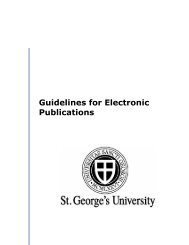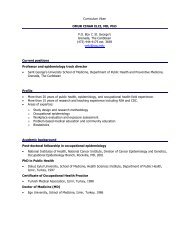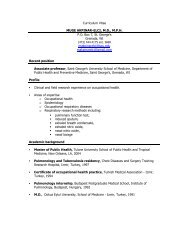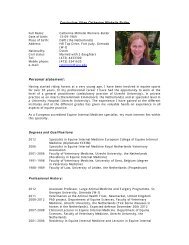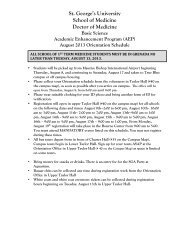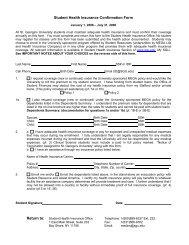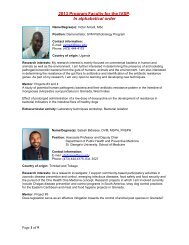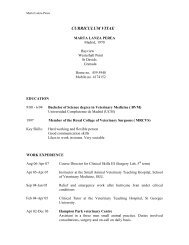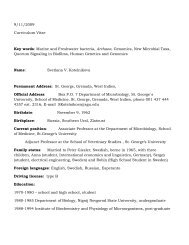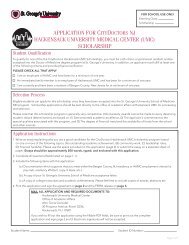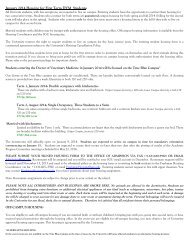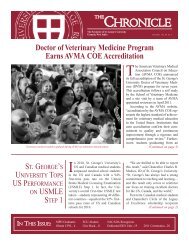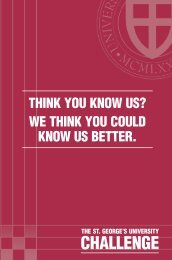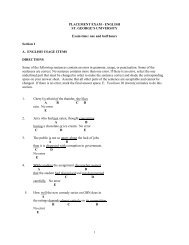SCHOOL OF 2012-2013 - St. George's University
SCHOOL OF 2012-2013 - St. George's University
SCHOOL OF 2012-2013 - St. George's University
Create successful ePaper yourself
Turn your PDF publications into a flip-book with our unique Google optimized e-Paper software.
School of Medicine<br />
Course Descriptions<br />
writing of a short review-type paper of a related given<br />
topic and a presentation given by the student. It contains<br />
lectures, interactive sessions with discussions and writing<br />
of a short communication article or conference abstract<br />
related to the basics of membrane biophysics and<br />
electrophysiology methodology. The course is relevant for<br />
understanding some of the current methodology used in<br />
e.g. drug development for treatment of diseases, such as<br />
various channelopathies. The course director will assign<br />
tasks (writing summaries, abstracts, or short proceedings/<br />
reviews) to each student based on the level of the student’s<br />
education and related to diseases and drug development.<br />
SCSK 543<br />
Observation in Medical Settings in UK and Grenada<br />
David Holmes, BSc (Hons.), PhD, CSci, FIBMS<br />
Robert Hage, MD, PhD, DLO, MBA<br />
Nirupma Kakkar, MD<br />
This selective is offered to expose students early to the life<br />
as a physician on both sides of the Atlantic. <strong>St</strong>udents will<br />
be able to apply basic science knowledge to cases seen in<br />
the physician’s everyday practice and present these to their<br />
peers and faculty. They will have a unique experience of two<br />
different health systems. A number of lectures/seminars will<br />
cover the history and management of health systems.<br />
SCSK 544<br />
Sports Medicine (NU)<br />
David Holmes, BSc (Hons.), PhD, CSci, FIBMS<br />
Nirupma Kakkar, MD<br />
Duncan French, PhD<br />
This selective exposes students to the current topics of<br />
research in sports medicine, allows them to interact with<br />
leading world experts specializing in sports physiology and<br />
medicine, and increases awareness about current issues<br />
and concerns in the field of sports medicine. <strong>St</strong>udents will<br />
be expected to attend various lectures and will have the<br />
opportunity to ask questions and interact with the invited<br />
speakers.<br />
SCSK 545<br />
Microbiology Selective I<br />
Amy Baldwin, PhD<br />
Gary Brown, PhD<br />
Svetlana Kotelnikova, PhD<br />
This course consists of laboratory and/or field research on<br />
an ongoing problem under the direction of one of the three<br />
above named principal investigators. Thirty-two hours of<br />
active research participation must be documented in order<br />
to obtain credit.<br />
SCSK 546<br />
Microbiology Selective II<br />
Amy Baldwin, PhD<br />
Gary Brown, PhD<br />
Svetlana Kotelnikova, PhD.<br />
This course consists of laboratory and/or field research on<br />
an ongoing problem under the direction of one of the three<br />
above named principal investigators. Thirty-two hours of<br />
active research participation must be documented in order<br />
to obtain credit.<br />
SCSK 547<br />
Clinical Microbiology Practice in Labs with Limited<br />
Resources<br />
Ateef Qureshi, PhD.<br />
The laboratory component of the Medical Microbiology<br />
(MICR 570) course is the minimum required for future<br />
physicians who intend to practice in developed countries<br />
with automated, professional laboratory support. <strong>St</strong>udents<br />
planning to serve in developing nations will benefit from the<br />
extra laboratory experience that will be provided by this onecredit<br />
selective. <strong>St</strong>udents who have an interest in infectious<br />
disease and diagnostic microbiology will also benefit from<br />
this selective. The objectives of the selective are to provide<br />
extensive practical hands-on laboratory-based experience<br />
and foster an appreciation of the safe handling of infectious<br />
materials and/or microorganisms. <strong>St</strong>udents must have a<br />
minimum GPA of 3.0, and either General Microbiology<br />
(BIOL 401) or Medical Microbiology (PATH 570) (pre- or<br />
co-requisite), as well as the permission of both the course<br />
director and Dean of <strong>St</strong>udents. A minimum of four to five<br />
students should register for the course to be offered.<br />
Clinical Years<br />
There are 80 weeks of clinical training. Every student takes<br />
42 weeks of core clinical rotations in the five major specialty<br />
areas—12 weeks of internal medicine, 12 weeks of surgery,<br />
and 6 weeks each of obstetrics/gynecology, pediatrics, and<br />
psychiatry. In addition to the core rotations, all students<br />
must complete four weeks of family medicine, a four-week<br />
medicine subinternship, a four-week medicine elective,<br />
and a four-week pediatric sub-internship or elective. To<br />
complete the clinical requirements, every student takes 22<br />
weeks of electives.<br />
74 | <strong>St</strong>. George’s <strong>University</strong>



